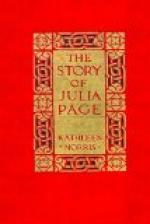“He’ll be right back,” Barbara said apathetically. “He’s driving Julie to the boat.”
For some reason Jim’s heart sank. He had supposed them as performing only some village errand, at the florist’s, the drug store, or the post office. A certain blank fell upon his spirits; Julia had her grievance, of course, but she seemed singularly indifferent to the—well, the appearances of things!
But Julia, alone on the boat, could have laughed in the joy of escape, in the new sense of freedom on which she seemed to float. Above all her sympathy for the family she so deeply loved, and above the sorrow of her own very real personal loss, rose the intoxicating conviction that Jim’s sway over heart and soul was gone; he was no longer godlike; no longer mysteriously powerful to hurt or to enchant her; he was just a handsome man nearing forty, not particularly interesting, not noticeably magnetic, not remarkable in any way.
She caught the welcoming Anna to her heart when she reached the Shotwell Street house, telling her sad news to the others over the child’s little shoulder. But the kisses she gave her daughter were inspired by joy instead of sorrow, and Julia lay down to sleep that night with a new content, and slept as she had not slept for months. With a confidence amounting almost to indifference she faced Jim on the day of the old doctor’s funeral, her beauty absolutely startling in its setting of demure black veil and trailing sombre garments.
Jim watched her, some curious emotion that was compounded of resentment and jealousy and astonishment darkening his face. So dignified, so poised, so strangely, hauntingly lovely she seemed, so much in demand and so quietly equal to all demands. Jim flattered his vanity for a while with the assurance that she was trying to impress as well as evade him, but could not long preserve the illusion; there was no acting there.
“Julia,” he said, when they were all at home again after the funeral, “I want to see you alone for a few moments, if I may?”
Julia was in the dining-room, busy with a great sheaf of letters. She gave a quick glance at the chair which Barbara had filled only a moment ago, as if realizing for the first time that she had been left alone.
“What is it?” she asked, dryly and unencouragingly.
Jim sat down, leaned back, folded his arms, and looked at her steadily, in a manner that might have been confusing. But Julia went on serenely opening, reading, and listing her letters.
“I want to ask how you are getting on, Julie,” said Jim at last, in a hurt tone. “I want to know if there is anything in the world I can do for you?”
“Nothing, thank you!” Julia said pleasantly. “Financially, I am very comfortable. You left me I don’t know how many thousands in the Crocker. I’ve never had one second’s worry on that score, even though I’ve never touched the capital—as you can easily find out.”




